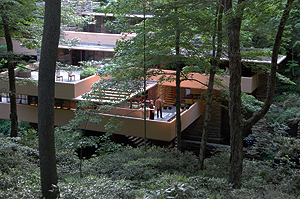Drama Unfolds on Fallingwater’s Terraces
For most Fallingwater fans, the residence’s most dramatic aspect is the way its cantilevered terraces jut out over Bear Run’s waterfall. And for many visitors, that setting, with the low rumble of water and the fresh scents of rhododendron in the air, elicits calm reflection.

Dimitrie Lazich, a performer with the Opera Theater of Pittsburgh, rehearses “Shining Brow” on Fallingwater’s Terraces.
Photo courtesy of the Pittsburgh Post-Gazette
Imagine that same terraces as the scene for an epic, twisting story that nears melodrama in its proportions. It’s the setting for a passionate affair between two wealthy, bright and married people; an estrangement between an aging mentor and his student; a fire that leaves a masterpiece in ruins; and the murder of innocents.
This is the experience audience members shared as the Opera Theater of Pittsburgh performed “Shining Brow,” an American opera with music by Daron Hagen and libretto by Northern Irish poet laureate Paul Muldoon, on Fallingwater’s exterior terraces. These June performances, which occurred on the weekend of what would have been Wright’s 146th birthday, marked the first time the Western Pennsylvania house had ever hosted an opera.
Opera Theater’s Artistic Director Jonathan Eaton directed the production about Fallingwater’s creator and arguably America’s most famous architect. The opera’s title is a translation of the Welsh word Taliesin, which was the name of Wright’s retreat in Wisconsin. The piece captures 11 tumultuous years of Wright’s life, which culminated with the deaths of seven – including Wright’s lover and her two children – and the fiery destruction of Taliesin.
“To have this work performed here is a great reminder of how Wright overcame all these troubles and went on to create this iconic building, one of the most loved works of all time,” said Lynda Waggoner, vice president of the Western Pennsylvania Conservancy and director of Fallingwater.

Performers from the Opera Theater of Pittsburgh rehearse on Fallingwater’s terraces.
Specifically, “Shining Brow” explores Wright’s relationships with his wife, Catherine (Kara Cornell); his mistress Mamah Cheney (Lara Lynn Cottrill); Mamah’s husband and Wright’s client, Edwin Cheney (Dimitrie Lazich); and his mentor, Louis Sullivan (James Flora). The role of Frank Lloyd Wright in this production was sung by Kevin Kees.
The story jumps from 1903 to 1914 and from Chicago to Spring Green, Wis. – where Taliesin is located – and to Berlin. During this time, Wright had a controversial relationship with Mamah, the wife of a client; the affair ended with her brutal murder in August 1914. She, her two children and four others died when a servant at Taliesin set fire to the house and attacked them with an axe.
The opera was first performed by the Madison Opera in 1993. Hagen, the recipient of the Guggenheim Fellowship, the Kennedy Center Friedheim Prize, two Rockefeller Foundation Bellagio Fellowships and the Seattle Opera Chairman’s Award, originally wrote the opera with Muldoon for a cast of 23 and a full symphonic orchestra. Hagen scaled down the production for Fallingwater, bringing the opera to two acts, cutting the chorus and trimming the orchestra.
Even with the trimming, the Opera Theater worked in tight quarters. The small, seven-player chamber orchestra, conducted by Robert Frankenberry, played on the house’s top terrace while the cast of five performed on two lower terraces. The company accessed the performance spaces through the house, while the audience viewed from seating areas on a path and a bridge.
“While Opera Theatre now presents a summer season, our company has a long tradition of touring,” Eaton said. “We’ve produced in a variety of spaces ranging from historical mansions and the Allegheny Cemetery to the Andy Warhol Museum and Carnegie Museum of Art. So, we (were) up for the challenge of staging a production in the magnificent cantilevered structure of Wright’s Fallingwater.”
Certainly, it’s not a traditional performance setting, which made onsite preparations and rehearsals crucial. Transforming the weekend home-turned-museum into an opera house required about three days of installing lights, platforms for seating and other equipment.
Soon into rehearsals, the singers discovered they needed to adjust their diction and other aspects of their performance in order to be clearly heard over the roar of the waterfall, which was louder than normal, thanks to recent rain. Also, navigating Fallingwater’s steps and halls took a bit of time to get used to. During a rehearsal days before the scheduled performances, Eaton reminded Kees that he missed a cue as he moved from a scene on one terrace to a second scene on another.
“I got a bit lost,” Kees laughed.
Due to the rain, the players were unable to complete full dress rehearsals as scheduled and performances shifted. Audiences, however shared intimate, rare experiences. On Friday, June 7, Fallingwater hosted a pre-show reception in the living room and on Saturday, June 8, a group of patrons traveled by charter bus to Mill Run, Pa., as Hagen and Opera Theater General Manager Scott Timm spoke to the group.
The performance at Fallingwater kicked off the Opera Theater’s 2013 SummerFest season – three weeks of opera and musicals sung in English, Mozart chamber and vocal recitals, and four new miniature comic operas all held in Pittsburgh’s The Twentieth Century Club.
